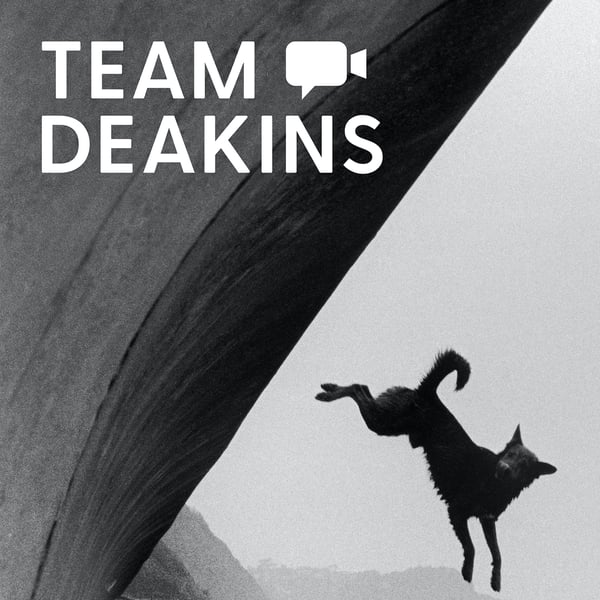TECHNICAL KNOWLEDGE - For Cinematographers
Team Deakins
James Ellis Deakins
4.8 • 1.4K Ratings
🗓️ 30 October 2024
⏱️ 93 minutes
🧾️ Download transcript
Summary
SEASON 2 - EPISODE 113 - Technical Knowledge for Cinematographers - with David Mullen
In this special episode of the Team Deakins Podcast, we’re joined by our friend and cinematographer David Mullen (Season 1, Episode 83) to discuss what and how much technical knowledge a cinematographer ought to know these days. The conversation includes specific explanations of technical details (such as the difference between film grain and digital noise) and more general subjects (such as the importance of telling a story and eliciting an emotional response from the audience). We also share a number of work stories, including Roger’s early-career exposure to cinematographer Douglas Slocombe’s internal light-meter and David’s experience seeing his work on a TV show smothered by a yellow filter during post. Reflecting on the diversity in images in older Hollywood films despite limited film stock and optical options, we maintain the position that the look of a film is the product of a cinematographer’s eye (rather than the technology one uses), and David elucidates how cinematographer Oswold Morris developed the desaturated look of director John Huston’s adaptation of MOBY DICK using the technology available to him to serve the storytelling. We also reflect on the lost knowledge of how films were made in the early digital days of the 2000s and stress the need to study and remember filmmaking history, recent and ancient. Towards the end, we also consider director Yasujiro Ozu’s prolific and effective use of a single 50mm lens when the conversation drifts towards the phenomenon of people avoiding “boring lenses”. Plus, we highlight the need to understand basic high school mathematics (no excuses!).
Cinematographers at all levels, from the aspiring to the battle-worn, can enjoy and learn from this discussion, and we hope you enjoy listening.
-
This episode is sponsored by Aputure
Transcript
Click on a timestamp to play from that location
| 0:00.0 | Hi and welcome to season two of the Team Deacons podcast, a collection of |
| 0:08.8 | informal conversations between Roger and James Deacons and a guest. |
| 0:13.0 | We never know where the conversation will take us, |
| 0:16.0 | so listen in and see where it goes. |
| 0:19.0 | This episode is sponsored by Aperture, a premier manufacturer of LED lighting with the industry's greatest variety of fixtures for your complete lighting needs. |
| 0:33.7 | Aperture recently announced the new storm family of lights, |
| 0:38.0 | with LED white light quality that matches natural daylight and classic tungsten bulbs |
| 0:43.7 | plus extreme low-end dimming while maintaining color quality. |
| 0:48.3 | Discover more about the new storm lights |
| 0:50.8 | and the complete aperture lighting ecosystem at |
| 0:54.0 | aperture.com. |
| 0:59.0 | Today we're focusing on a topic and joining us in this discussion is cinematographer David Mullen. |
| 1:05.0 | If you frequent our website, you'll know him as the wizard who can answer the hard technical questions. |
| 1:11.0 | We want to focus on the question of how much and what technical |
| 1:14.4 | knowledge it's important for a cinematographer to know these days. |
| 1:18.0 | David, thank you for joining us. It's great to be here. Do you want to start, Reg? Well, yes, I mean, let's just |
| 1:26.8 | start as a general overview. What do you think is technically is necessary for a cinematographer these days to know. I mean |
| 1:36.7 | things have changed obviously since digital intermediaries let alone digital capture. |
| 1:44.8 | So what what's from your perspective is crucial for somebody to know? |
| 1:51.3 | Well, it's tricky because, I mean, ultimately what you need to know is that the big picture issues, you know, which is telling stories with image and light and lighting composition. |
| 2:03.9 | All those things are so important that the technical side is like, you know, 10% of that, right? |
| 2:11.0 | There's 90% of it's just filmmaking, putting the camera in the right place and |
... |
Transcript will be available on the free plan in -151 days. Upgrade to see the full transcript now.
Disclaimer: The podcast and artwork embedded on this page are from James Ellis Deakins, and are the property of its owner and not affiliated with or endorsed by Tapesearch.
Generated transcripts are the property of James Ellis Deakins and are distributed freely under the Fair Use doctrine. Transcripts generated by Tapesearch are not guaranteed to be accurate.
Copyright © Tapesearch 2025.

